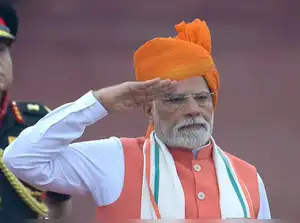Prime Minister Narendra Modi addressing the nation on 79th Independence Day in New Delhi on Friday
Analysts say, Modi’s statements on GST indicate that the much awaited GST reduction proposals in Health Insurance and Term life insurance policies, which is on anvil for the last one year, may be now be implemented during Diwali
New Delhi: Prime Minister Narendra Modi on Friday said the next generation reforms in Goods and Services Tax (GST) will be unveiled by Diwali in the month of October, which will provide ‘substantial’ tax relief to common man and benefit small and medium enterprises.
Addressing the nation on 79th Independence Day, Modi said the time has come to undertake reforms in GST as the indirect tax regime has completed 8 years.
Analysts say, PM Modi’s statements on GST indicate that the much awaited GST reduction proposals in Health Insurance policies and Term life insurance policies, which are on the anvil for the last one year, may be now be implemented in October.
GST, which subsumed a host of taxes and local levies, was rolled out on July 1, 2017.
The country currently levies GST at 5%, 12%, 18% and 28% on most goods and services, excluding gold and silver, and applies an additional levy on so-called demerit items such as cigarettes and high-end cars.
Earlier, the government had almost finalised the plans to reduce GST both in Term Life Insurance and Health Insurance from 18 per cent to 12 per cent with Input Tax Credit(ITC) and want insurers to pass on this benefits to the customers.
“We have discussed with states and we will usher in next generation GST reforms by Diwali, which will be a Diwali gift for citizens. Tax on items of common man will be reduced substantially. Our MSMEs will benefit hugely. Daily use items will become cheaper, which will also strengthen our economy,” Modi said in his speech from the ramparts of the Red Fort.
A Group of Ministers (GoM) comprising state finance ministers is already discussing the rate rationalisation and pruning of slabs in GST.
Modi said the government has undertaken tax reforms to make life easier for citizens, and improved capabilities has aided in raising the tax-free income limit of an individual to Rs 12 lakh per annum.
In his address to the nation on the 79th Independence Day, Modi said the government has undertaken reforms to fast-track income tax refunds and also implement faceless assessment.
“We have also undertaken reforms to make life easier for citizens. Income tax refund, faceless assessment, raising tax-free income limit to Rs 12 lakh per annum are all result of tax reforms. No one ever imagined that tax relief on income up to Rs 12 lakh is possible. When a nation’s capability increases, its citizens benefit,” Modi said.
In the 2025-26 Budget, the government had raised the income tax rebate threshold from Rs 7 lakh per annum to Rs 12 lakh. Taking into account standard deduction, the effective tax rebate comes to Rs 12.75 lakh a year.
A salaried person earning Rs 12.75 lakh a year will not have to pay any income tax.
The government has previously said that it wants to change GST rates and reduce the number of brackets, referring to tax rates for different categories, under a tax regime introduced in 2017.
Citi estimated that about 20% of items – including packaged food and beverages, apparel and hotel accommodation – fall under the 12% GST slab, accounting for 5-10% of consumption and 5-6% of GST revenue.
If most of these are moved to the 5% slab and some to the 18% slab, it could lead to a revenue loss of around Rs 500 billion , or 0.15% of GDP, potentially taking the total policy stimulus for households in the current 2025-26 financial year to 0.6%-0.7% of GDP, the brokerage said.

